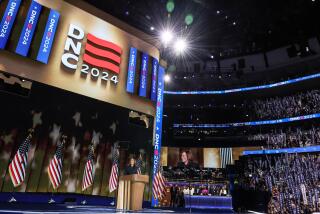‘92 REPUBLICAN CONVENTION : TELEVISION ANALYSIS : Media, Politicians Are Cozy Companions
- Share via
Those old, old chums--media and politicians--continue to yuk it up on the campaign and convention trail.
Despite their critics, who accuse them of lusting for and manufacturing conflict, some of the media appear to be hooked on congeniality when it comes to covering political fights. Some adversaries.
While battling for the Democratic nomination for President, Edmund G. (Jerry) Brown Jr. spent weeks blasting the eventual standard-bearer, Bill Clinton. However, when Brown refused to publicly endorse Clinton at last month’s Democratic National Convention, some of the TV coverage had a disapproving, “tsk-tsk” tone, as if the former California governor was somehow being petulant by not doing the blatantly hypocritical thing and changing positions.
Conversely, only one TV eyebrow was raised when Patrick J. Buchanan made a rhetorical U-turn Monday night at the Republican Convention by, in effect, conferring sainthood on President Bush, the man he once called “King George.”
“Were they just words?” CBS correspondent Ed Bradley asked a GOP delegate about Buchanan’s past criticism of Bush. Getting a non-answer, he let the matter drop.
Insincerity--to say nothing of outright lying--is now so institutionalized in politics that many in the media seem to have become desensitized to it. They are used to being told fibs. They expect it, they accept it.
And by their acquiescence, they encourage it.
For no reason other than to fill air time at both conventions, for example, TV has continued to seek out those spewing oil slicks as they operate as spokespersons for their parties.
They include Democratic National Chairman Ronald H. Brown, a master of answering questions that aren’t asked, and his double-talking GOP counterpart Richard N. Bond, who was interviewed at the podium Monday by NBC’s Maria Shriver.
“We are America,” Bond gushed about the Republicans. “Those other people are not America.” The obvious comeback was to ask Bond if he was saying “those other people”--of course, he meant Democrats--were somehow un-American merely because they aren’t Republicans. Unchallenged, his words hung there, lingering beside the other verbal pollutants choking the air inside the Astrodome.
And there was Larry King in CNN’s headquarters overlooking the convention floor Monday, interviewing conservative television preacher Pat Robertson, a GOP presidential candidate four years ago.
Is it true, King wanted to know, that Robertson had been telling people “God told you to vote for Bush?” Robertson, who can out-grin even Clinton, hemmed and hawed. King pressed him. “I might have said that,” Robertson finally admitted. You wanted to know just when God gave him the word. Did God also tell him whether Dan Quayle should stay on the ticket? And did God tell Robertson to run against Bush in 1988?
But no. King and “Pat”--as he was called by the talk-show host--laughed like old pals and went on to something else.
Such closeness with guests is a King staple. No harm when the interviewee is a Hollywood star, but there should be some distance separating King when his guest is a politician with a bill of goods to sell. When Democratic vice presidential candidate Albert Gore was a guest during his party’s convention, he was dressed in shirt sleeves and loud suspenders just like those King wears every night. By the end of the hour, King was calling the Tennessee senator “Al.” And so on and so on.
Gore knows how to work the media, evidenced also by his recent satellite interview with KCBS-TV anchor Hosea Sanders. After Gore made a fuss about their mutual Southern background, Sanders appeared to mentally climb on Gore’s lap.
At least, Sanders didn’t call Gore “Al.” The media champion in that category is the CNN pundit show, “Capital Gang,” on which a panel of print journalists flank a guest, usually a member of Congress, who is addressed by his first name.
The half-hour, being run nightly during the GOP convention, as it was during the Democratic event, has a clubby atmosphere that unwisely brings politician and journalists together in almost a party atmosphere--as the gap separating these traditional adversaries disappears.
More to Read
Get the L.A. Times Politics newsletter
Deeply reported insights into legislation, politics and policy from Sacramento, Washington and beyond. In your inbox three times per week.
You may occasionally receive promotional content from the Los Angeles Times.










